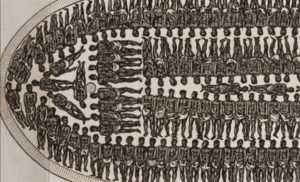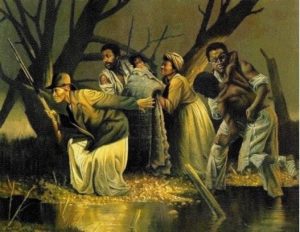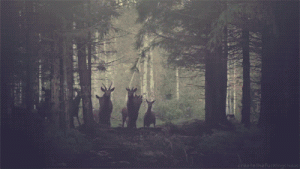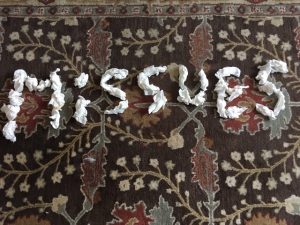I’ve chosen the following three poems for their chronological treatment of American Black history, from slavery, and the underground railway, to segregation, and the Civil Rights Movement. I would use these in a unit on African-American Poetry, after teaching a novel studies unit on “In the Heath of the Night” by John Ball.

The Witnesses
BY HENRY WADSWORTH LONGFELLOW
In Ocean’s wide domains,
Half buried in the sands,
Lie skeletons in chains,
With shackled feet and hands.
Beyond the fall of dews,
Deeper than plummet lies,
Float ships, with all their crews,
No more to sink nor rise.
There the black Slave-ship swims,
Freighted with human forms,
Whose fettered, fleshless limbs
Are not the sport of storms.
These are the bones of Slaves;
They gleam from the abyss;
They cry, from yawning waves,
“We are the Witnesses!”
Within Earth’s wide domains
Are markets for men’s lives;
Their necks are galled with chains,
Their wrists are cramped with gyves.
Dead bodies, that the kite
In deserts makes its prey;
Murders, that with affright
Scare school-boys from their play!
All evil thoughts and deeds;
Anger, and lust, and pride;
The foulest, rankest weeds,
That choke Life’s groaning tide!
These are the woes of Slaves;
They glare from the abyss;
They cry, from unknown graves,
“We are the Witnesses!”
Analysis – Rhetorical Purpose
Longfellow’s narrative ballad “The Witnesses,” is a political cry of shame against the public’s blindness to the injustice of slavery, and a call to political action. The ballad takes the perspective of the ghosts of slaves who have perished in the Atlantic. From their final resting place on the ocean bed, the former slaves bear witness to all the slave ships “freighted with human forms” (line 10) crossing from Africa to North America, above them:
“They glare from the abyss” (line 30)
“They cry, from unknown graves,” (line 31)
“We are the Witnesses” (line 32).
‘To witness’ of course, means to see a crime, and then to report it. The fact that the only witnesses to slavery are the dead, who no longer have real agency, points to the fact that the living, who do have agency, are not acting. I understand this as Longfellow shaming the living into action. In fact, the poem was published as part of a 31-page collection called: Poems on Slavery, in 1842 (Cambridge, MA: J. Owen), “[…] and the New England Anti-Slavery Tract Association quickly reprinted an abbreviated 8-page version that included [this] poem[…]” (Lockard, Web 2017).
Form and Imagery
The 32-line ballad of perfect rhyming couplets, is in two parts, each part separated by, and completed with, a refrain. The first half of the poem, consisting of three stanzas, is located in the “Ocean’s wide domain” (line 2), while the second three stanzas take place “Within Earth’s wide domain” (line17). Apart from the refrain, these lines contain the only repetition in the poem, and I think it’s significant that they serve as the introductory phrases of each half of the ballad.
The word ‘domain,’ usually signifies the place where someone or something lives. But as each half of the ballad describes, slaves have no habitat in this world: the ocean is either the slaves’ grave, or the route to slavery, while on the land “Are markets for men’s lives” (line 18). It’s as though the after-life is the only place slaves can ‘live.’ While there is no overt religiosity in the poem, is Longfellow deliberately drawing attention to the spirits of slaves as a plea for his readers to acknowledge that slaves are made in God’s image, endowed with souls, every bit equal to White men and women? From the oceanic domain, “They gleam from the abyss” (line 14) and one imagines the Eternal light. In the final stanza before the last refrain (lines 26-28), Longfellow places causal blame for slavery in the sins of:
“Anger, and lust, and pride;
“The foulest rankest weeds,”
“That choke Life’s groaning tide!”
The ‘The Witnesses’ is formally precise, written in eight ballad quatrains of perfect, intermittent, rhyming couplets. Each half of the ballad has three stanzas, ending with the refrain. All but seven lines of the poem end with the letter ‘s’. Most of the lines missing the final ‘s’ occur in the second half of the poem, and this contributes to a mood change which highlights the difference between the flowing, watery, and hard, earthly domains that divide the poem.
Every line of the poem is exactly six syllables long, and when said aloud, the metrical effect is that of the relentlessness of the horror of slavery. By the end of the 32 lines, the reader is weary, and ready to stop. When the ballad, unusually, ends in the first person plural: “We are the Witnesses” (line 32), it powerfully places the living, free, White, reader in the position of the witness to all of the misery and injustice detailed in the poem. With all of his devices, Longfellow is shaming his reader/orator into seeing slavery as inhuman and immoral, and to choose to act to abolish it, on the eve of the American Civil War.
References
Lockard, J. Longfellow and Whittier on slavery. Anti-Slavery Literature. Web. Accessed August, 2017. http://antislavery.eserver.org/poetry/longfellowwhittier/
Poem #2
Underground Railroad Song Lyrics:
Follow the Drinking Gourd
Story: The lyrics were instructions on how to get to safety. They were taught by a man known as Peg Leg Joe. The young slaves would use to song to know when it is safe to run, and where it is safe to go.

Lyrics:
When the Sun comes back
And the first quail calls
Follow the Drinking Gourd,
For the old man is a-waiting for to carry you to freedom
If you follow the Drinking Gourd
The riverbank makes a very good road.
The dead trees will show you the way.
Left foot, peg foot, travelling on,
Follow the Drinking Gourd.
The river ends between two hills
Follow the Drinking Gourd.
There’s another river on the other side
Follow the Drinking Gourd.
When the great big river meets the little river
Follow the Drinking Gourd.
For the old man is a-waiting for to carry to freedom
If you follow the Drinking Gourd.
Poem #3: Theme song from the movie “Selma” about the Civil Rights Movement
Glory
John Legend, Common
One day when the glory comes
It will be ours, it will be ours
Oh one day when the war is won
We will be sure, we will be sure
Oh glory (Glory, glory)
Oh (Glory, glory)
Hands to the Heavens, no man, no weapon
Formed against, yes glory is destined
Every day women and men become legends
Sins that go against our skin become blessings
The movement is a rhythm to us
Freedom is like religion to us
Justice is juxtapositionin’ us
Justice for all just ain’t specific enough
One son died, his spirit is revisitin’ us
Truant livin’ livin’ in us, resistance is us
That’s why Rosa sat on the bus
That’s why we walk through Ferguson with our hands up
When it go down we woman and man up
They say, “Stay down”, and we stand up
Shots, we on the ground, the camera panned up
King pointed to the mountain top and we ran up
One day when the glory comes
It will be ours, it will be ours
Oh one day when the war is won
We will be sure, we will be sure
Oh glory (Glory, glory)
Oh (Glory, glory)
Now the war is not over, victory isn’t won
And we’ll fight on to the finish, then when it’s all done
We’ll cry glory, oh glory (Glory, glory)
Oh (Glory, glory)
We’ll cry glory, oh glory (Glory, glory)
Oh (Glory, glory)
Selma’s now for every man, woman and child
Even Jesus got his crown in front of a crowd
They marched with the torch, we gon’ run with it now
Never look back, we done gone hundreds of miles
From dark roads he rose, to become a hero
Facin’ the league of justice, his power was the people
Enemy is lethal, a king became regal
Saw the face of Jim Crow under a bald eagle
The biggest weapon is to stay peaceful
We sing, our music is the cuts that we bleed through
Somewhere in the dream we had an epiphany
Now we right the wrongs in history
No one can win the war individually
It takes the wisdom of the elders and young people’s energy
Welcome to the story we call victory
The comin’ of the Lord, my eyes have seen the glory
One day when the glory comes
It will be ours, it will be ours
Oh one day when the war is won
We will be sure, we will be sure
Oh glory (Glory, glory)
Oh (Glory, glory)
Oh glory (Glory, glory)
Hey (Glory, glory)
When the war is won, when it’s all said and done
We’ll cry glory (Glory, glory)
Oh (Glory, glory)
Songwriters: John Roger Stephens / Lonnie Rashid Lynn – Glory lyrics © EMI Music Publishing



